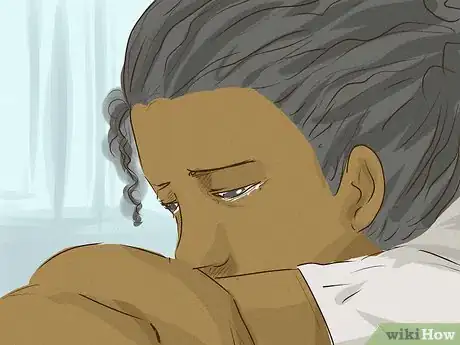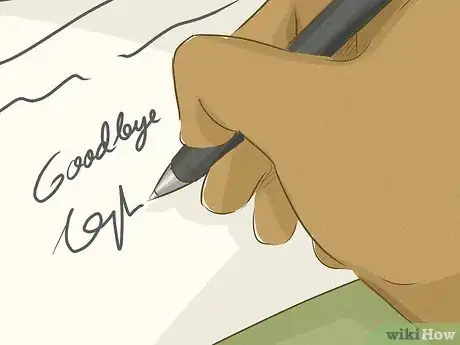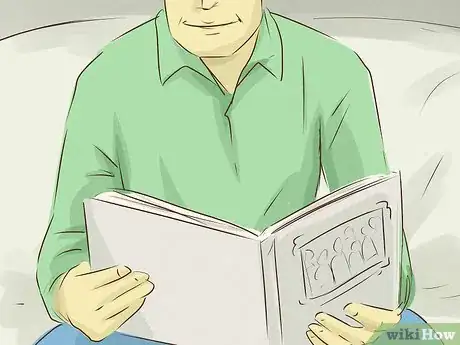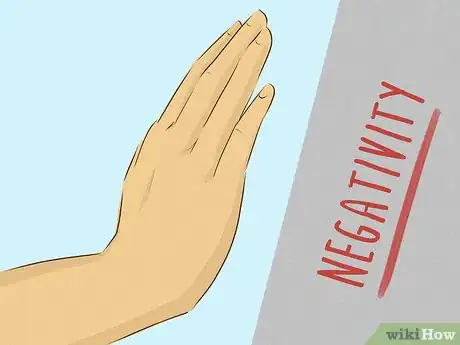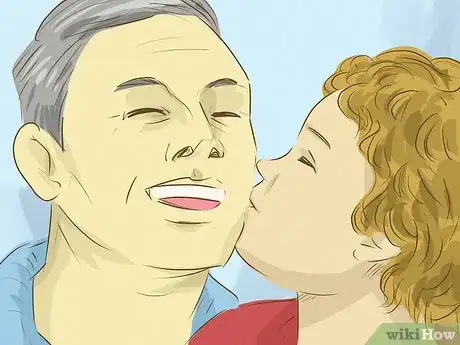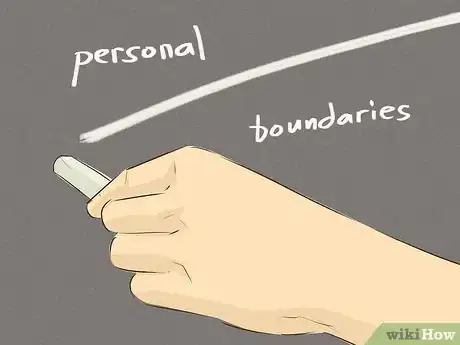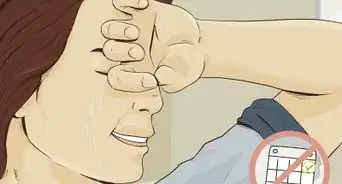This article was co-authored by Mental Health America. Mental Health America is the nation's leading community-based nonprofit dedicated to addressing the needs of those living with mental illness and promoting overall mental health for all. Their work is guided by the Before Stage 4 philosophy – that mental health conditions should be treated long before they reach the most critical points in the disease process.
There are 12 references cited in this article, which can be found at the bottom of the page.
wikiHow marks an article as reader-approved once it receives enough positive feedback. This article received 13 testimonials and 84% of readers who voted found it helpful, earning it our reader-approved status.
This article has been viewed 416,315 times.
Are you feeling hurt right now because of the loss of a friend, a break-up, a betrayal, or any other upsetting life circumstance? No matter what caused you to feel that way and regardless of the impact, it's important to recognize that pain is a part of life. Luckily, most painful feelings tend to get better with time. In the meantime, you can make positive changes in your life to help yourself feel better and start to move on after a painful event.
Steps
Making Positive Emotional Changes
-
1Acknowledge and accept what hurt you. Define your pain and label it for what it is instead of letting it define you. A major disappointment or an unexpected hurt can be hard to accept. It may be so painful that you can barely stand it. Still, acknowledging your pain can help you heal and move on.[1]
- Take a few moments to just breathe and think about your feelings without trying to judge or analyze them. For example, you might think, “I'm feeling sad and angry because of my fight with Shirley.”
- Naming your feelings will allow you to separate those feelings from who you are as a person. Remind yourself that it's okay to feel however you feel—your negative emotions do not make you a bad person, a failure, or any less of a person.
- Don't try to ignore your emotions or deny what you are feeling. Ultimately, this will just make it harder to deal with them.
-
2Allow yourself to grieve. If you've experienced a major hurt, you may need time to feel sad, frustrated, confused, or angry. Depending on what happened, you may struggle with these feelings for months or even years.[2] Remind yourself that it's normal to experience negative feelings after a loss or betrayal, and don't try to force yourself to get over it or move on before you're ready.
- When you're grieving, you may feel sad, angry, confused, hopeless, or even guilty about what you are feeling (or not feeling). You might also find yourself focusing or obsessing on the bad event. You will likely experience ups and downs, feeling much better one day and then worse again the next.
- If you feel like you can't cope with your grief or that it's making it hard for you to function from day to day, talk to your doctor or a counselor about what you're going through.
Tip: Grief is unpredictable, and it affects everybody in different ways. For example, some people may cry a lot, while others may feel numb or get angry. Don't put pressure on yourself to react to a hurt or loss in a particular way just because you think it is what's expected of you.
Advertisement -
3Gain control of your emotions. You may not be able to ignore or change the emotions that you feel after being hurt, but there are ways to manage them. Emotions are an important part of being a human—they allow you to feel for yourself and others. Still, they can also take over your life if you let them. You can gain control of your emotions by trying a number of strategies:[3]
- Try taking a positive action. If you are taking steps to fix the issue, your emotions won't be in the driver's seat—your practicality will be. For example, if you're upset because you got rejected for a job you wanted, spend some time brushing up your resume.
- Shift your focus away from what's bothering you. Distract yourself from what's wrong until you can gain some perspective. Go to the gym. Phone a light-hearted friend. Go pick up groceries or run errands. It's harder to feel down on yourself when you are making moves.
- Do some simple relaxation exercises if you're feeling tense or upset. For example, you might try some breathing exercises, yoga, or a little meditation.
-
4Perform a ritual to help you get closure. Just as every relationship or event has a start, they usually have a natural end. You can also help create an end through closure. Define the ritual ahead of time so you know when you have done what you needed to do to have closure.[4]
- For example, if you feel hurt by someone's actions, you may get closure by confronting the wrongdoer and trying to forgive them. If you take this route, try not to blame the other person for what happened. Instead, simply express how you feel and explain how you want to move forward. Say something like, “I was really hurt by what you did. I need space to decide if I want to continue the relationship or not. I will contact you if I decide to.”
- Another possible strategy may be as simple as returning the property of an ex-spouse and saying a final goodbye. Give yourself time to get the task done, but not enough time to draw it out.
-
5Avoid dwelling on the past. Acknowledge the situation that caused your hurt and know that, as it ends, you are no longer obligated to feel sad about it. Do not let this situation become who you are—it's just something that happened to you. After you have accepted the reality of the hurt and tried to find closure, the next step is moving on. This means altering your thoughts so that you are not constantly dwelling on what happened.
- One way to avoid dwelling on the past is to learn from what happened and come up with a plan to prevent it from happening again. Brainstorm different ways you can improve your current situation or write down a list of lessons you learned from going through it. When you take action after a negative event, you empower yourself to move forward.[5]
- Keep a journal or talk to someone you trust to help you get through your emotions.[6]
Practicing Positive Thinking
-
1Appreciate the good in your life. Remember that regardless of what happened, you are not broken and there is nothing wrong with you. The situation may change the way you think for some time, but it does not change the fact that there is still good in your life.
- Reconnect with activities you enjoy and recognize any positive things happening in your life. Start a gratitude journal that focuses on the things that are going right in your life. Over time, you may find that you have much to be happy and thankful for.[7]
- If you have any close friends or family members, or even a beloved pet, take time to connect with them and appreciate the positive difference they make in your life.
- Take time to appreciate even small things. For instance, maybe you had a particularly delicious cup of tea today, or saw a movie that you really enjoyed.
-
2Let go of the negative. Think positively. Recognize that filling your head with negative chatter can actually bring your whole life down. If you find yourself thinking negatively, catch yourself in the moment and try to attack the negative thought and switch it into a more positive or realistic statement.[8]
- For example, challenge a negative thought, such as, “I will never know good wholesome people who aren't trying to manipulate me,” by thinking of any person you know who has shown kindness and trustworthiness. Once you identify at least one person who fits this positive category, you have attacked and invalidated the negative claim.
Did you know? When you're used to thinking negatively, it can be hard to make the transition to positive thinking. You can make the transition more easily by first replacing negative thoughts with more neutral and realistic ones.[9]
-
3Surround yourself with positive, happy people. People like your family, friends, a special someone, and many others can help renew your faith in humanity after being hurt. Be inspired by them to recover and eventually move on from that hurt feeling.[10]
- If you don't have any close friends, try taking a class or joining a club for people who share your interests. These are great ways to meet new people and connect with activities that bring you joy.
- Find friends you can talk to and even turn the hurt into a testimony to share with others. You may be able to use what happened to you as a forewarning so that others may avoid the same issue.
- For example, you might say to a friend, "Hey, Samantha, can we talk? I wanted to tell you about something that happened to me..." Then, you might share your story. Ask for support by saying something like, "I could really use a hug right now."
Learning to Rebuild
-
1Take responsibility for your own actions and feelings. If you own your part in what happened to you, you have the opportunity to become empowered and find growth from the experience. This does not mean you have to take all the blame or feel ashamed of what happened. Instead, take an honest look at any mistakes you made or any lessons you may be able to take from the experience.
- You may find it freeing to know what you can change going forward to avoid the problem again. This is a way to take back your power and stop giving other people or your circumstances power over you.
-
2Share your story with someone you trust. Sometimes, being able to talk about something that hurt you can lessen the pain. Give yourself time and freedom to cry, laugh, and tell the stories you need to share. You may find things that seem like a huge problem suddenly aren't as bad when you share your experiences with friends.[11]
- Feeling sad or in pain is not something you should hide from those around you. It's hard to get your needs met if you don't tell people you are close to that you need support.
- You might start by saying something like, "I have been meaning to tell you all about what I have been going through. You may not know it, but you have been a great source of support for me..."
- You can also attend a support group for people who have been through similar experiences and share your story with them.
-
3Take good care of yourself. It's hard to start feeling better emotionally if you're not caring for yourself physically. Even if you don't feel like doing anything, remind yourself to eat, sleep on a regular schedule, and get a little exercise. Make a commitment to support feeling better by taking care of yourself.[12]
- Treating yourself with kindness when you've been hurt is an important part of the recovery process.
- Aim to eat a healthy, balanced diet, perform at least 30 minutes of physical activity each day, and sleep at least 7-9 hours each night.
- It may also help to engage in some self-care activities that help you reduce stress, like reading a book or playing fetch with your dog.
Tip: In addition to caring for your physical and emotional health, practicing self-care can also mean keeping up with practical matters. Try to take a little time each day to deal with things that you need to get done, like doing homework, paying bills, or getting groceries.
-
4Set personal boundaries for the future. If you've been hurt in a relationship, establishing clear boundaries can help prevent similar problems in the future. Come up with a list of basic needs and non-negotiables for your relationships to have on hand in the days to come. It is up to you to assert yourself and let others know what you expect from a friendship or relationship.[13]
- This list can serve as a guide for the sort of interactions you want to have with others. If you ever feel like your needs are not being met based on the boundaries you've set, then you can head off issues before they spread into new hurts or betrayals.
- You might include guidelines such as not being in relationships with people who make you compromise your values, not dealing with people who abuse drugs or engage in criminal activity, or not putting undue effort into a one-sided relationship.
- Make sure you communicate your boundaries clearly with others, and also let them know what the consequences will be if they don't respect those boundaries. For example, “I love you, Mom, but I won't be able to visit for the holidays if you keep making comments about my weight.”
Expert Q&A
Did you know you can get premium answers for this article?
Unlock premium answers by supporting wikiHow
-
QuestionHow can I stop caring about people who don't care for me?
 Paul Chernyak, LPCPaul Chernyak is a Licensed Professional Counselor in Chicago. He graduated from the American School of Professional Psychology in 2011.
Paul Chernyak, LPCPaul Chernyak is a Licensed Professional Counselor in Chicago. He graduated from the American School of Professional Psychology in 2011.
Licensed Professional Counselor
References
- ↑ http://tinybuddha.com/blog/10-happiness-tips-for-people-who-have-been-hurt/
- ↑ https://www.nhs.uk/conditions/stress-anxiety-depression/dealing-with-grief-and-loss/
- ↑ https://www.psychologytoday.com/blog/fulfillment-any-age/201502/5-ways-get-your-unwanted-emotions-under-control
- ↑ https://www.psychologytoday.com/articles/200312/how-fix-your-hurt-feelings-1
- ↑ https://www.psychologytoday.com/blog/the-squeaky-wheel/201306/the-seven-hidden-dangers-brooding-and-ruminating
- ↑ https://psychcentral.com/blog/why-ruminating-is-unhealthy-and-how-to-stop/
- ↑ http://www.liveinthemoment.org/how-to-heal-a-broken-heart/
- ↑ http://www.webmd.com/balance/express-yourself-13/negative-self-talk
- ↑ https://www.forbes.com/sites/melodywilding/2016/08/15/forget-positive-thinking-this-is-how-you-actually-change-negative-thoughts/#98f27146c462
About This Article
To stop feeling hurt, the first thing you should do is acknowledge what hurt you and try to accept that it happened so you can grieve in a healthy way. Then, after you've given yourself time to feel hurt, try to move on by focusing on the good parts of your life, like your friends and family. You can also start feeling better by doing the things you love, whether it's reading, spending time in nature, or learning something new. For more tips from our Counselor co-author, like how to be positive when you're feeling down, read on!

